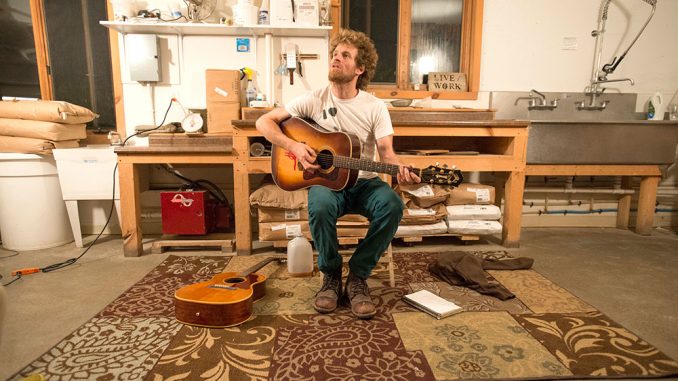
Chad Stokes warns his fans that his set might be interrupted with a baby crying as he looks up at the candle-lined stairs on which his wife and young child are sitting.
He doesn’t have a microphone, just a stool and a guitar.
“The older one is awake still, so you might just hear a little chatter,” he said.
It’s an unusual thing to hear at the beginning of a concert, but it sets a mood of togetherness and family for the evening. It was a night of music, stories, laughter and even a marriage proposal.
Chad Stokes has had a successful musical career. His band Dispatch has played in front of more than 100,000 people and came back from a hiatus to an extremely well-attended reunion tour. He’s continued his musical career with his band State Radio, with whom he has toured the world and released four full-length albums.
Between all this, he has released solo material.
On Sept. 26, Stokes played in a living room in Kensington for a handful of people.
During Stokes’ Living Room Tour, he plays in the living room of a fan from a city. The only requirements: enough space to hold about 50 people and a stool.
Stokes has always been up front with his connection of social activism and music, from the Zimbabwe benefits of Dispatch to the powerful political content of State Radio. This tour is in ties with the organization Calling All Crows, which was spearheaded by Stokes and his wife, Sybil Gallagher, in 2008. Before each tour date, the group meets with fans to do volunteer work for a local organization.
“We just wanted to be as effective as possible in terms of the different cities we were going into,” Stokes said. “We can meet up with fans ahead of time to engage in service, and we tried it out a couple times and it worked. You get a good sense of each city when you’re messing around in the city and you’re there doing something real instead of just coming into the venues.”
The connection of good deeds and music has shown positive results.
“People in their 20s believe in doing good,” Stokes said. “Music carries with it a responsibility, so it’s amazing when you can tap into someone beyond just being at the show. We’ve had so many people get involved, and it really renews my faith in the generations that are coming behind me.”
Before the Philadelphia date, Stokes and the Calling All Crows volunteers met up in Conshohocken, Pa., with Cradles to Crayons, an organization that collects supplies for children like books, clothes, toys, cradles and crayons. These care packages are then sent to children in need.
The show started quietly, as Stokes descended the stairway barefoot through the crowd, sitting on pillows on the hardwood floor. He had just put his baby to sleep upstairs. He opened with a new song called “Dead Badger,” a soulful swing about a young girl who ran away from home and was making her way across the country when she was picked up by State Radio’s tour bus.
Stokes would give the fans a very in-depth look into how lyrics and songs were formed. He told stories about the early days of being on the road or events from his life that influenced lyrics. Sometimes he would stop mid-song to explain where the next part came from. Occasionally, he would go off on a tangent until he remembered he was still in the middle of a song.
He played a mix of old and new, featuring old favorite Dispatch songs like “Open Up,” State Radio standbys like “Omar Bay,” and “Calling All Crows.”
Three songs into the set came the most special point of the evening, during the State Radio song “Indian Moon.” Stokes had slipped the name “Kayla” in to the chorus and an audience member stood up in the middle of the song and the music stopped. When he pulled the girl next to him up, and said “Kayla, I love you so much,” the whole crowd knew what was happening. He proposed, and received the largest applause of the evening.
The show was open to requests, but no one had to shout over each other like in a crowded venue. It was similar to asking a friend on the couch to play a song you like.
“I just need to make sure I know my songs well,” Stokes said. “And that I am somewhat learned all across the board of my catalog, so that when people yell requests I can get away with it. I had some help.”
Stokes would agree to a song but would sometimes have to remember what chord went where, or the next line of the verse, which the crowd was more than happy to help with.
After the show, it became a group of people casually talking like it was a small party with friends. Stokes signed a few autographs and took pictures but mostly just chatted with fans.
The next stop on the tour was Washington. When asked if Stokes would be staying the night or just driving to the next destination, Stokes said they’d drive.
“Touring with the children, it’s a lot,” Stokes said. “For them to be just sleeping in random houses like now, and then we try to transfer them to the van without them waking up, just trying to get them to sleep.”
Brendan Menapace can be reached at BSmenapace@temple.edu.



Be the first to comment